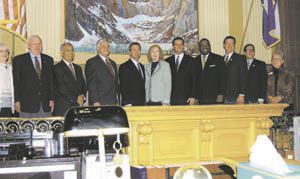Colorado Hospital Provider Fee bill crosses important first hurdle
A Senate committee on Tuesday advanced bipartisan legislation that would finally pump money into ailing roads, schools and hospitals by restructuring the thorny Hospital Provider Fee.
A conversation years in the making, Senate Bill 267 passed the Republican-controlled Senate Finance Committee 4-1. The bill now heads to appropriations for consideration, where it continues to face an uphill battle.
Once a subject that was considered off limits in Republican circles because of implications to the Taxpayer’s Bill of Rights, bipartisan support to restructure the fee as an enterprise fund marks a monumental moment in the legislature’s evolution on the subject.
“We have one chamber controlled by Republicans, one chamber controlled by Democrats, and we have a governor’s office,” said Sen. Jerry Sonnenberg, R-Sterling, a co-sponsor of the legislation. “What is that compromise we have to come up with to meet the requirements for health care, for education, for transportation?”
“Both of our parties should be able to embrace this fix,” added Senate Democratic Leader Lucia Guzman of Denver, who is carrying the legislation with Sonnenberg. “It speaks to all of our core values – transportation, education, commerce, capital construction and successes for Colorado.”
The bill has impressive sponsorship in the Democratic-controlled House as well, where it is backed by House Democratic Leader KC Becker of Boulder and Rep. Jon Becker, R-Fort Morgan.
Panels of hospital executives, school officials and business leaders spoke Tuesday of the importance of establishing a more permanent funding stream, especially in rural Colorado where hospitals may close and schools are barely functioning.
The issue hit a tipping point this year as state budget writers proposed a $264 million reduction of the Hospital Provider Fee to eliminate surplus taxpayer rebates and free money for spending on other budget issues.
The budget has already passed both chambers and is awaiting a review of amendments. Much of the final budget will rest on what lawmakers do with the Hospital Provider Fee. Without a fix, the legislature’s hands are essentially tied and hospitals will see cuts.
With the federal match, hospitals in Colorado stand to lose about $528 million. Some hospitals have said they would close.
Freeing money for state spending
By enterprising the fee as a government-owned business in a separate fund, lawmakers would avoid hitting constitutional state spending limits under the Taxpayer’s Bill of Rights. The move would free money for state spending.
At the same time, the legislation would lower the overall base of state tax revenue subject to spending limits by $670 million to protect taxpayer rebates. The provision is something that Republicans have demanded in any discussion of restructuring the Hospital Provider Fee.
The 57-page bill also would require the governor’s office to consider a 2 percent mostly across-the-board cut to state executive departments.
The legislation would direct $1.2 billion towards state roads and highways and at least $150 million would be used for capital construction. At least 25 percent of the money would have to go towards projects in rural Colorado, with county populations of 50,000 or less.
The legislation would secure up to $100 million per year for 20 years to cover up to $1.35 billion by allowing the state to borrow money to undertake large projects. The first draft of the bill would have authorized lease-purchase agreements for state facilities, allowing the state to use its buildings as assets to leverage revenue.
But the legislation was amended on Tuesday after concerns were raised over the legality of authorizing such lease-purchase agreements. Instead, the bill would rely on certificates of participation, where the state would make lease payments for assets.
The measure was also amended to increase funding for capital projects by ensuring that money paid out of the state’s transportation fund for debt services is proportional to the amount of money spent on capital projects.
Addressing concerns
Critics of the bill say it would be illegal to restructure the fee without voter approval or legislation that would allow the legislature to create a new TABOR-exempt enterprise.
“This bill is a direct run around TABOR. As a taxpayer, I’m not in favor of that for many reasons,” said Scott Rankin, with right-leaning Free Market Healthcare Advocates. “Many people do now know what the Hospital Provider Fee is … we call it a fee, but I still maintain it’s a tax.”
But Sen. Owen Hill, R-Colorado Springs, said he understands the move to be legal because the legislation would also lower the base of state tax revenue.
“My understanding of the constitution – regardless of what we think of this specific policy of the Hospital Provider Fee, and I share your frustration with that – if we are going to move something out of the General Fund … if there’s a concomitant reduction in the base or the cap on spending that equals what we moved out, then that fits under TABOR,” Hill said.
Republican Attorney General Cynthia Coffman has offered her legal blessing to restructuring the fee.
Rankin acknowledged that he is not an expert on the subject or an attorney.
While the legislation earned Hill’s support on Tuesday, he said he hopes that if the bill reaches the Democratic-controlled House, that it won’t change the measure so significantly that it loses his support.
Democrats claimed that the situation could have been solved years ago had Republicans previously supported a restructuring of the Hospital Provider Fee. Republicans, meanwhile, blamed the state’s budget woes on ballooning Medicaid costs.
“This is a bill that highlights the failure of this legislature,” said Sen. Tim Neville, R-Littleton, who cast the lone “no” vote against the measure, suggesting that the state’s problem is a rapidly growing state budget.
“We know that the Medicaid expansion has a lot to do with that … but it’s more than that,” he said. “It’s a lack of prioritization.”
The bill was amended by Republicans to resurrect a proposal from earlier in the year that would allow Medicaid recipients to go out of network. That is likely to lose support if the bill makes it to the House.
With concerns from both sides of the aisle, the fate of the legislation remains precarious, despite the significant win on Tuesday.
“I don’t think it will come as a surprise to anybody in this room or to the sponsors …” said Sen. Lois Court, D-Denver, who said she supported the bill to keep the conversation going. “I have grave concerns about many of the pieces and parts in this bill.”












